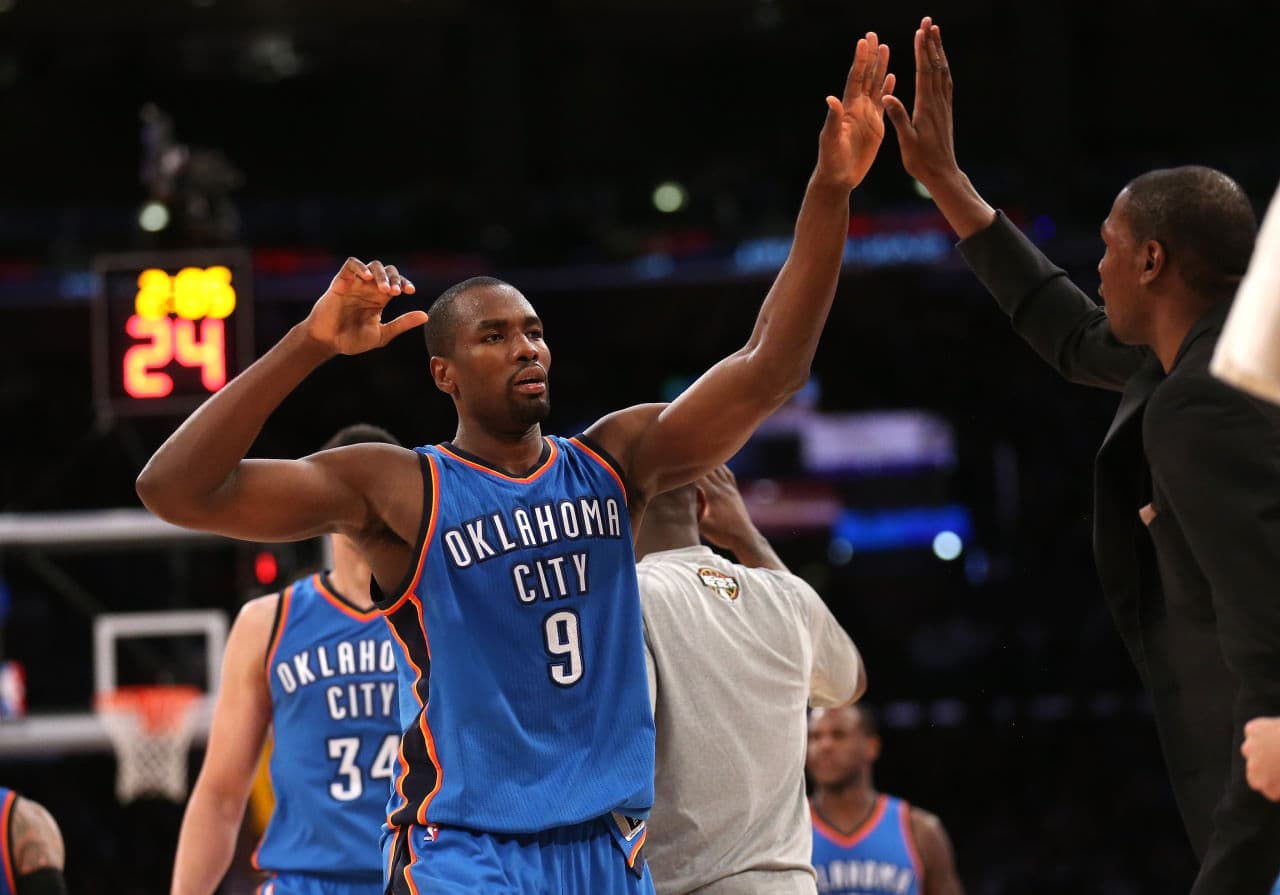Advertisement
NBA's Serge Ibaka Returns Home In 'Son Of The Congo'
ResumeBefore becoming a starter for the Oklahoma City Thunder, Serge Ibaka lived for a time on the streets in the Republic of Congo. In the new documentary titled “Son of the Congo,” Ibaka returns home.
Ibaka and Adam Hootnick, the film's director, joined Bill Littlefield.
BL: Serge, was it hard for you to bring a film crew to the Congo and talk about some of the more difficult parts of your childhood?
I feel like my story can really inspire a lot of young people.
Serge Ibaka, Thunder forward
BL: Adam, how much of Serge's story did you know before you started filming, and I'm curious about whether you were surprised by how candid he is and was?
AH: Yeah, I knew almost nothing. Before I met him, I knew almost nothing and then we spoke a little bit, and I think as soon as I spoke to him, the look in his eyes and the way he leans forward in his chair when he talks about what his dreams are and why he is going back. Serge was so open and confident that if he let people into his experience and his story, that it would do good for kids who are growing up the way he grew up.
BL: Serge, whenever you go home, people ask you for money. What do they say?
SI: Some people are asking for money. Some people are asking for pictures. Some people are just asking me, "Shake my hand." It's different but it's something we're used to. That's how it is in Africa, and I enjoy it because my culture — that's my culture, so I love it.

BL: Adam, you're likely far less familiar with the culture of asking for money in Congo. How did those moments feel to you as you were filming them?
AH: One of the best things we had going for us a lot of the time is we had no idea what anybody was saying. So had I known the questions and demands that were being shouted at him, I probably would have been a little more tense than I was. It's physically claustrophobic sometimes, but we would take our cues from Serge. He never loses patience or grace — that's the word I use to describe how he handles himself there. And so if Serge ever ran and ducked for cover, then we would have done the same.
BL: Serge, in the film you say that your visits home are more important than "going to Monaco for vacation or going to Brazil to watch the World Cup." But do you ever find yourself just thinking, "Man, it would be nice to just relax and enjoy some of what I've been able to earn in the NBA?"
SI: Yes, I think about it sometimes, too. But you know what? I would tell myself, "Monaco or Brazil or wherever, it's gonna go nowhere. It's gonna be there." What I did was something good. Something important — to save some peoples' lives, to make some people smile. You know, I'm 25. I'm young. I want to have fun because I work hard and I want to enjoy it. But also I'm thinking, "I have time to do it. No rush."
BL: Adam, you didn't spend all of your time following Serge around. You also found a 15-year-old basketball player named Ricardo. Tell me a little about him and why you felt it was important to tell his story in the film.
AH: Well, so Ricardo is growing up, I think, very similarly in some ways to the way that Serge grew up. He would play basketball with no shoes and he would play basketball on days he didn't necessarily have food and he would play basketball on days when he slept in a car in a parking lot. I felt like if there was a way to pair his story with a kid who is hoping to be the next Serge Ibaka against all odds, in the way that Serge was hoping to be Serge Ibaka against all odds, that that would make the story real in a different way than just hearing Serge talk about it. So his character and his focus reminded me a lot of what it sounded like Serge was like when he was younger.
BL: Serge, during the documentary you say, “the dream is free.” But most Congolese basketball players will not make it to the NBA. Do you ever worry that you're inspiring them to follow that specific dream and that it may not come true?
SI: When I say about "dream is free," I don't only mean about basketball or to be in the NBA like Serge Ibaka. No. I mean in general, in anything you do. You can do anything you want, anything you dream about. You can do it. You just have to know the dream is free. And dream is free for everybody.
This segment aired on April 18, 2015.